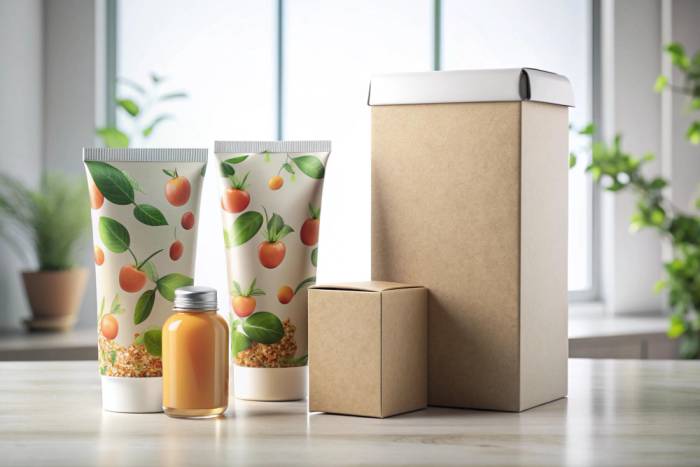Innovative Solutions in Fox Packaging: The Ultimate Guide to Sustainable Packaging Trends
Warning: Undefined variable $post in /home/dietofli/public_html/wp-content/plugins/code-snippets/php/snippet-ops.php(584) : eval()'d code on line 3
Warning: Attempt to read property "ID" on null in /home/dietofli/public_html/wp-content/plugins/code-snippets/php/snippet-ops.php(584) : eval()'d code on line 3
The estimated reading time is 10 minutes
Warning: Undefined variable $post in /home/dietofli/public_html/wp-content/plugins/oxygen/component-framework/components/classes/code-block.class.php(115) : eval()'d code on line 3
Warning: Attempt to read property "ID" on null in /home/dietofli/public_html/wp-content/plugins/oxygen/component-framework/components/classes/code-block.class.php(115) : eval()'d code on line 3

Key Takeaways:
- Sustainable packaging is crucial due to its environmental impact, particularly from traditional plastics, which contribute to pollution and resource depletion.
- 73% of consumers are willing to pay more for sustainable packaging, highlighting the shift towards eco-friendly solutions.
- Fox Packaging actively supports the sustainability movement by developing innovative packaging solutions that reduce environmental burdens.
- Biodegradable and compostable materials are gaining popularity, offering less harmful alternatives to traditional plastics.
- Plant-based plastics significantly reduce greenhouse gas emissions and are favored by consumers seeking sustainable options.
- Using recycled content in packaging minimizes the reliance on virgin materials and supports the circular economy.
- Smart design enhances brand visibility and customer experience while maintaining sustainability practices.
- Consumer behavior is shifting towards minimalism and transparency in packaging, pushing brands to adapt their strategies.
- Technological advancements facilitate sustainable packaging innovations, allowing for customized and resource-efficient solutions.
- Case studies like Unilever and Coca-Cola demonstrate effective integration of sustainability into business strategies, setting benchmarks for others.
The Green Revolution: Why Sustainable Fox Packaging Matters
Understanding the Environmental Impact of Packaging
Packaging plays a critical role in the global economy, facilitating transportation and preserving product integrity.
However, this convenience comes with a steep environmental cost. Traditional packaging materials, predominantly plastic, contribute significantly to pollution and resource depletion. In 2019, a staggering 368 million tons of plastic were produced globally, with only a fraction recycled, leading to mountains of waste that can take centuries to decompose. The production of conventional packaging materials also requires substantial energy and raw materials, exacerbating climate change.
Sustainable packaging, particularly innovations seen in Fox packaging, seeks to alleviate these environmental burdens by utilizing renewable resources, reducing overall material waste, and promoting a circular economy where materials are reused or repurposed instead of discarded. Understanding these impacts isn't just essential for manufacturers; it's a pivotal factor for consumers who increasingly demand accountability and eco-friendliness in the products they purchase.
Consumer Demand for Eco-Friendly Solutions
Consumer awareness regarding environmental issues is at an all-time high, and this shift in mindset has transformed how brands approach packaging.
According to a recent survey, 73% of consumers are willing to pay more for sustainable packaging, recognizing it as a contributing factor to their overall purchasing decisions. Brands like Fox Packaging have tapped into this sentiment by prioritizing eco-conscious strategies, developing packaging solutions that not only meet customer expectations but also align with their values.
This demand isn't uniform but varies across demographics, with younger consumers showing even stronger preferences for sustainable choices. As consumers become more educated about environmental issues, they are actively researching and engaging with brands that uphold sustainability as a core value. Thus, companies can no longer afford to view sustainability as just a marketing gimmick; it must be integrated into their operational framework and corporate philosophy.
Fox Packaging’s Role in the Global Sustainability Movement
Fox Packaging has emerged as a pivotal player in the global effort towards sustainability, innovating eco-friendly packaging solutions while maintaining high-quality standards that companies rely on. They have embraced a holistic approach that encompasses the lifecycle of packaging, from sourcing renewable materials to optimizing production processes for minimal waste. This commitment is reflected in their partnerships with organizations and initiatives aimed at reducing environmental footprints within the packaging industry.
Furthermore, Fox Packaging’s investment in research and development has resulted in significant advancements in biodegradable and recyclable materials, setting a benchmark for industry peers. Their efforts align with global sustainability goals, such as the UN Sustainable Development Goals, particularly Goal 12, which focuses on ensuring sustainable consumption and production patterns. By leading the charge in implementing sustainable practices within packaging, Fox Packaging provides a blueprint for other companies looking to mitigate their environmental impact.
Innovative Materials Transforming Fox Packaging
Biodegradable and Compostable Options: The Future of Materials
The evolution of packaging materials has ushered in a range of biodegradable and compostable options that are significantly less harmful to the environment than traditional plastics. Biodegradable materials decompose naturally through the action of microorganisms, while compostable materials provide an environmentally safe option when processed through composting systems, resulting in nutrient-rich soil.
Fox Packaging prioritizes these materials, utilizing substances like plant-based plastics derived from renewable resources such as corn starch and sugarcane. These alternatives not only provide the necessary durability that consumers expect from their packaging but also contribute to reducing landfill waste. With certification standards such as ASTM D6400 ensuring that these materials meet specific environmental criteria, consumers and businesses can confidently choose biodegradable and compostable packaging solutions, knowing they contribute to a healthier planet.
Exploring Plant-Based Plastics: A Breakthrough in Packaging
Plant-based plastics represent a revolutionary advancement in packaging, offering a sustainable alternative to conventional petroleum-based options. Produced from renewable resources, these materials can significantly reduce greenhouse gas emissions during their lifecycle.
Fox Packaging is at the forefront of utilizing such innovations, crafting packaging solutions that not only align with eco-friendly practices but also retain the necessary properties for effective product protection. These plastics can be designed to be compostable, ensuring that, when disposed of, they break down into non-toxic components, seamlessly integrating back into the environment.
The rise of plant-based plastics is increasingly supported by consumer preferences, with a growing proportion of the market calling for sustainable choices. As technology advances, the potential for plant-based plastics is vast, potentially transforming entire sectors of the packaging industry while promoting a more sustainable future.
The Rise of Recycled Content: Minimizing Waste and Maximizing Value
The incorporation of recycled materials in packaging is another significant trend gaining momentum within the sustainable sector. Recycled content minimizes the demand for virgin materials, reducing the overall environmental impact associated with production. Fox Packaging has fully embraced this concept, integrating recycled components into their packaging solutions without compromising quality or performance. The utilization of recycled content demonstrates a commitment to the circular economy, where materials are continuously repurposed, thereby diverting waste from landfills.
Additionally, brands that employ recycled materials often see positive responses from consumers, enhancing brand loyalty and demonstrating corporate responsibility. The push for recycled content is gradually becoming a key performance indicator for businesses, reflecting their sustainability efforts and adaptability in a rapidly evolving market. With advancements in recycling technologies, the future of recycled content in packaging looks promising, potentially leading to a substantial reduction in environmental footprints across various industries.
Designing with Purpose: Aesthetic Meets Functionality
How Smart Design Can Boost Brand Visibility
The integration of smart design within packaging is not only a matter of aesthetics but a powerful tool for enhancing brand visibility and recognition. In an increasingly competitive landscape, compelling packaging design draws attention, making products stand out on shelves and online platforms. Fox Packaging understands the balance found in marrying functionality with striking visuals, producing solutions that convey brand identity while providing practical benefits.
Packaging that is well-designed tells a product's story, engages consumers, and encourages purchases, making it an essential element of marketing strategies. Incorporating elements such as unique shapes, eye-catching colors, and innovative structural designs can effectively differentiate a brand from competitors, capturing consumer interest and facilitating brand recall. As the trend towards unique packaging grows, brands leveraging design as a strategic asset will likely see enhanced performance in their market segments.
Functional Packaging Solutions: Enhancing User Experience
Functional packaging is pivotal in enriching the consumer experience, as it addresses practical needs while maintaining sustainability. Fox Packaging emphasizes user-centric design, ensuring that its packaging solutions are convenient, easy to use, and environmentally friendly. For example, packaging that allows for resealing helps preserve product freshness, while easy-to-open designs cater to accessibility for those with differing physical abilities. Such considerations improve the overall user experience, thereby driving customer satisfaction and fostering brand loyalty.
Additionally, functional packaging can enhance shipping and storage efficiency, reducing transportation costs and minimizing environmental impacts associated with logistics. As consumers prioritize convenience alongside sustainability, the demand for functional packaging continues to rise, urging brands to innovate and improve their packaging designs to resonate with modern customers.
The Intersection of Art and Sustainability in Packaging Design
The interplay between art and sustainability in packaging design is increasingly vital in crafting memorable consumer experiences. Creative packaging that embodies artistic expression not only enhances aesthetics but also conveys a brand's values and commitment to sustainability.
Fox Packaging recognizes this convergence, producing packaging that is beautiful and functional, utilizing eco-conscious materials that do not compromise artistic integrity. A strong narrative can be communicated through artistically designed packaging, evoking emotion and connection with consumers. Packaging as an art form can elevate mundane products into distinctive experiences, encouraging repeat purchases.
Furthermore, such designs often inspire sustainability messages, reinforcing the idea that eco-friendly choices can be beautiful and desirable. As the industry continues to evolve, the fusion of art, functionality, and environmental consciousness will play a crucial role in shaping the future of packaging.
Staying Ahead of the Curve: Trends Shaping the Future of Fox Packaging
Consumer Behavior and its Impact on Packaging Trends
As the dynamics of consumer behavior evolve, the impact on packaging trends becomes increasingly pronounced. Today's consumers are well-informed and actively engaged in their choices, prioritizing sustainability, transparency, and ethical practices in their purchasing decisions. Brands, including Fox Packaging, must stay attuned to these shifts, tailoring their packaging solutions to meet emerging preferences. For instance, consumers gravitate toward minimalist packaging designs that reflect simplicity and clarity, often favoring materials that convey sustainability credentials.
Additionally, there's a growing emphasis on transparency regarding sourcing and production methods, compelling companies to communicate their sustainable efforts clearly. This trend has repercussions across the supply chain, urging manufacturers to adopt more responsible practices. As consumer priorities evolve, businesses that proactively respond through innovative packaging solutions will succeed in capturing market share and building lasting relationships with their customer base.
Technological Advances: How Innovation is Driving Change
Technological innovation is a primary driver of change within the sustainable packaging landscape, providing avenues for enhanced materials, designs, and processes that can radically shift paradigms. Advanced manufacturing technologies, such as 3D printing and digital printing, enable brands like Fox Packaging to create customized packaging solutions that align with sustainability goals while lowering costs. Smart technology integration, such as QR codes or augmented reality features, can enhance the consumer experience, providing information on sustainability efforts, recycling guidelines, or product origins.
Furthermore, breakthroughs in materials science continue to fuel advancements in biodegradable and recyclable materials, ensuring that the options available to manufacturers remain diverse and environmentally friendly. The rapid pace of technological advancement necessitates that brands remain agile, adapting their strategies and investing in research and development. Those unable or unwilling to innovate risk being left behind in a market characterized by increasing consumer demand for sustainability and responsibility.
Case Studies: Brands Leading the Way in Sustainable Packaging
Examining the successes of brands pioneering sustainable packaging initiatives provides valuable learning opportunities for others in the industry. Unilever, for instance, has made significant strides in reducing plastic waste by using 100% recyclable or compostable packaging by 2025.
Their approach combines innovation with transparency, allowing consumers to appreciate the steps the brand has taken towards sustainability. Similarly, brands like Coca-Cola are implementing sustainable packaging strategies, with goals to collect and recycle a bottle or can for every one sold by 2030.
These case studies exemplify how sustainability can be integrated into a company's core strategy, producing mutual benefits for the environment and business performance. Fox Packaging can draw insights from these leaders, customizing their practices to enhance sustainability efforts while maintaining competitiveness in the market. By learning from industry pioneers, brands can navigate the complexities of the sustainable packaging landscape and establish themselves as leaders in their own right.














